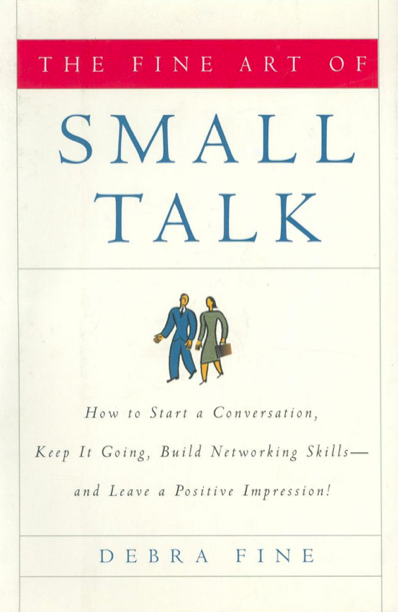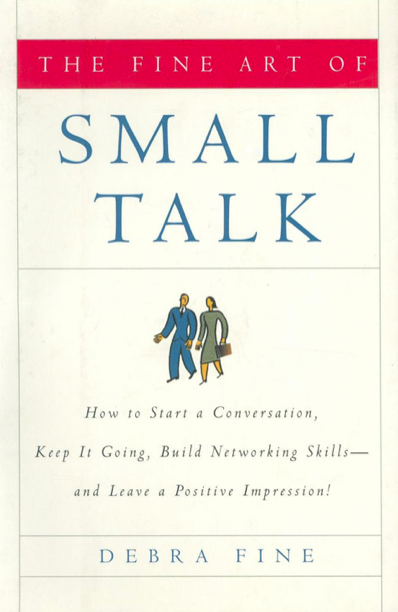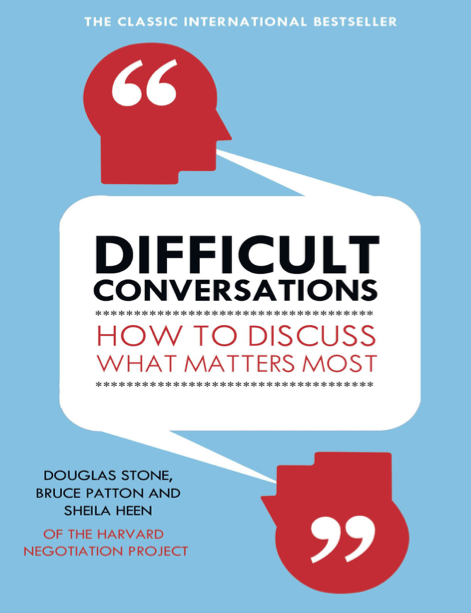The Fine Art of Small Talk: How to Start a Conversation, Keep It Going, Build Networking Skills - and Leave a Positive Impression! | Debra Fine
![]()
![]()
Debra Fine Business Etiquette Communication Reference Communication Skills Interpersonal Relations Academic & Commercial Writing Reference Conversation Etiquette Guides Business Image & Etiquette Communication & Social Skills Relationships Business Culture Business & Money
- درباره کتاب
- بخشی از کتاب
- نسخه چاپی فارسی
- نظرات
Nationally recognized communication expert Debra Fine reveals the techniques and strategies anyone can use to make small talk--in any situation. Do you spend an abnormal amount of time hiding out in the bathroom or hanging out at the buffet table at social gatherings? Does the thought of striking up a conversation with a stranger make your stomach do flip-flops? Do you sit nervously through job interviews waiting for the other person to speak? Are you a "Nervous Ned or Nellie" when it comes to networking? Then it's time you mastered The Fine Art of Small Talk.
With practical advice and conversation "cheat sheets," The Fine Art of Small Talk will help you learn to feel more comfortable in any type of social situation, from lunch with the boss to an association event to a cocktail party where you don't know a soul.
Editorial Reviews
From Publishers Weekly
Would-be social butterflies will get encouragement but little inspiration from this not quite scintillating self-help primer. Fine, a conversation consultant, insists that small talk is the necessary overture to deeper communication, the key to generating business leads and dates and a pathway to a richer life in which strangers are magically transformed into acquaintances. She covers such cocktail-party conundrums as how to spot "approachable" interlocutors, how to make introductions, how to butt into an intriguing conversation, resuscitate a flagging one and bail out of a boring one, and how to resist one-uppers, know-it-alls, motormouths and other abusers of talk. Given the ingrained human reluctance to talk to strangers, will, not technique, is the real issue. Much of the book is taken up with motivational pep-talks to get readers to initiate contact (one agonizing exercise suggests "walk through the mall and just say hello to ten people as you pass them"); in a world where everyone feels at a loss for words, Fine argues, saying virtually anything makes one a "hero." Unfortunately, it doesn't necessarily make one a great conversationalist. The heart of Fine's methodology consists of long lists of icebreakers and inviting questions that she instructs readers to memorize and regurgitate as needed to jump-start and sustain conversations, and these read like rather bad small-talk-dull ("How has the internet affected your life?"), stilted ("Do you have a personal motto or creed?") and awkward ("Describe an embarrassing moment you've had."). Tongue-tied readers can benefit from her pointers and exhortation, but one hopes they will think a little harder before they speak.
Copyright © Reed Business Information, a division of Reed Elsevier Inc. All rights reserved. --This text refers to an alternate kindle_edition edition.
From Library Journal
These two books treat similar subjects, but the contrasts are significant. One covers the entire landscape of speaking, whereas the other focuses just on "small talk." The title of Speak from the Heart describes the book's very solid premise. Emmy Award-winning broadcaster and motivational speaker Adubato emphasizes the importance of being genuine as he attempts to cover every conceivable speaking situation, including public speaking, private conversations, group discussions, and listening. He guides readers in the use of eye contact, developing a conversational style, and being comfortable with their message. Despite many charming personal anecdotes and stories drawn from other sources, this book remains a heavy read. Ironically, while Adubato tells us to make a connection with our audience rather than to "cover the material," he does a much better job of covering the material than of connecting. In contrast, Fine fully engages her audience. She involves readers in the discussion and gives lists of lines people can use to start, maintain, or end a conversation. She discusses conversation topics and how to use them and also includes quizzes, throws in a poem, and scatters a few cartoons to break up the text. Originally released as an audiocassette in 1997, this work comes across much like one of her seminars on small talk. The Fine Art of Small Talk does everything that Speak from the Heart says should be done. Adubato's book is best for academic libraries or large public and business libraries. Fine's is a better choice for most public libraries, as well as business libraries. David Leonhardt, Toronto
Copyright 2002 Reed Business Information, Inc. --This text refers to an alternate kindle_edition edition.
About the Author
Debra Fine is a former engineer, now nationally recognized as a speaker and trainer. Organizations such as Lockheed Martin, Credit Suisse First Boston, First Data Corporation and the GlaxoSmithKline Pharmaceuticals along with hundreds of insurance, real estate, legal, financial and health care associations and singles groups regularly host her Small Talk programs. --This text refers to the audioCD edition.
Review
From Library Journal These two books treat similar subjects, but the contrasts are significant. One covers the entire landscape of speaking, whereas the other focuses just on "small talk." The title of Speak from the Heart describes the book's very solid premise. Emmy Award-winning broadcaster and motivational speaker Adubato emphasizes the importance of being genuine as he attempts to cover every conceivable speaking situation, including public speaking, private conversations, group discussions, and listening. He guides readers in the use of eye contact, developing a conversational style, and being comfortable with their message. Despite many charming personal anecdotes and stories drawn from other sources, this book remains a heavy read. Ironically, while Adubato tells us to make a connection with our audience rather than to "cover the material," he does a much better job of covering the material than of connecting. In contrast, Fine fully engages her audience. She involves readers in the discussion and gives lists of lines people can use to start, maintain, or end a conversation. She discusses conversation topics and how to use them and also includes quizzes, throws in a poem, and scatters a few cartoons to break up the text. Originally released as an audiocassette in 1997, this work comes across much like one of her seminars on small talk. The Fine Art of Small Talk does everything that Speak from the Heart says should be done. Adubato's book is best for academic libraries or large public and business libraries. Fine's is a better choice for most public libraries, as well as business libraries. David Leonhardt, Toronto Copyright 2002 Reed Business Information, Inc. --Library Journal
From Publishers Weekly Would-be social butterflies will get encouragement but little inspiration from this not quite scintillating self-help primer. Fine, a conversation consultant, insists that small talk is the necessary overture to deeper communication, the key to generating business leads and dates and a pathway to a richer life in which strangers are magically transformed into acquaintances. She covers such cocktail-party conundrums as how to spot "approachable" interlocutors, how to make introductions, how to butt into an intriguing conversation, resuscitate a flagging one and bail out of a boring one, and how to resist one-uppers, know-it-alls, motormouths and other abusers of talk. Given the ingrained human reluctance to talk to strangers, will, not technique, is the real issue. Much of the book is taken up with motivational pep-talks to get readers to initiate contact (one agonizing exercise suggests "walk through the mall and just say hello to ten people as you pass them"); in a world where everyone feels at a loss for words, Fine argues, saying virtually anything makes one a "hero." Unfortunately, it doesn't necessarily make one a great conversationalist. The heart of Fine's methodology consists of long lists of icebreakers and inviting questions that she instructs readers to memorize and regurgitate as needed to jump-start and sustain conversations, and these read like rather bad small-talk-dull ("How has the internet affected your life?"), stilted ("Do you have a personal motto or creed?") and awkward ("Describe an embarrassing moment you've had."). Tongue-tied readers can benefit from her pointers and exhortation, but one hopes they will think a little harder before they speak. Copyright © Reed Business Information, a division of Reed Elsevier Inc --Publisher's Weekly
:این کتاب توسط ۱ ناشر منتشر شده است
نشر قطره | هنر گفتگو | ترجمه مرجان مهدیپور










هنوز نظری ثبت نشده
اولین نفری باشید که نظر میدهید
ثبت نظر